LIXIL makes pioneering water and housing products that solve everyday, real-life challenges, making better homes a reality for everyone, everywhere.
- Global Site
-
- English
- Japanese
- Brand Sites
Global
- Global Site
-
- English
- Japanese
- Brand Sites
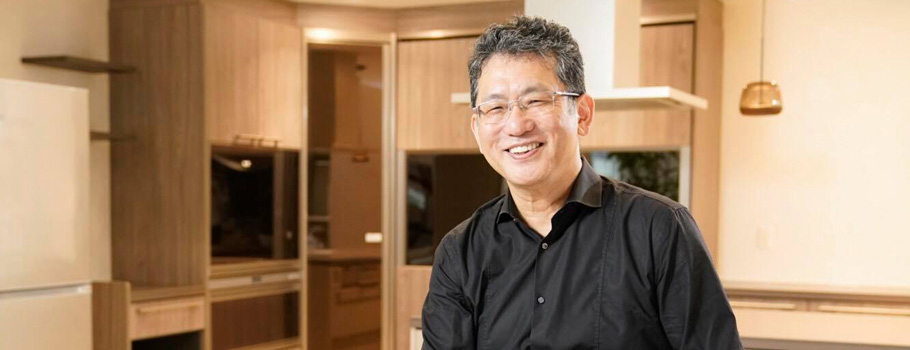
Updated: September 30, 2020
How has LIXIL fared amid COVID-19? How has the Medium Term Plan (MTP) helped prepare for the “new normal”? What do we need to grow for the long term and contribute to society? We had the opportunity to sit down with CEO Kinya Seto to hear first-hand how he views LIXIL’s global operations, the steps taken by management to streamline the company and empower employees, and what we need for future success.
You have pursued LIXIL’s MTP since 2017. In the “new normal” of a world affected by COVID-19, do you need to recalibrate your strategy?
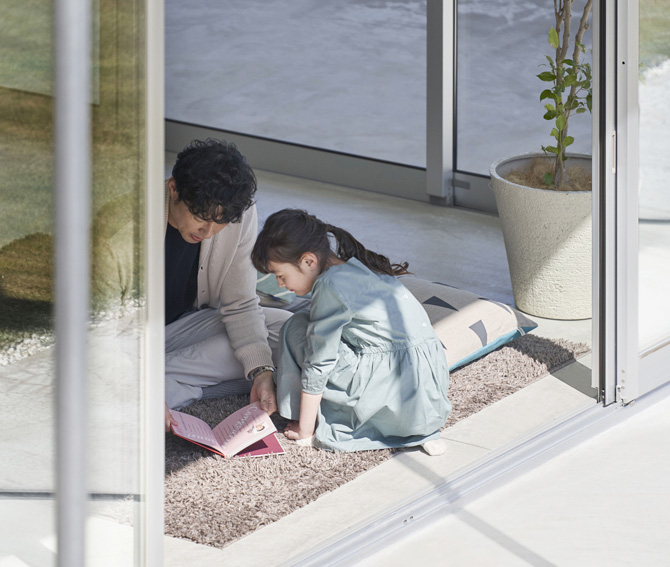
The “new normal” is changing how families spend time at home
Not at all. In fact, the strategy that we set out in our MTP fundamentally prepared us for many of the changes that have come with this new reality. In the MTP, we emphasize differentiated products. With people now spending more time at home, they have a better understanding of the benefits of advanced technology and meaningful designs. Second, the MTP emphasizes the need to motivate our employees and to help them to adapt to a new and more agile way of working. We developed ahead of time the extensive technical infrastructure, software and bandwidth needed to enable the tens of thousands of video meetings that now take place weekly across the organization. And most importantly, steps taken to focus on our core businesses and to simplify our business structure are enabling us to focus our resources to drive growth. Overall, I believe COVID-19 and the global recession have sped up the pace of change beyond what anyone had anticipated, which is why our ability to respond quickly in all of these areas has been so important.
So how is the COVID-19 pandemic affecting LIXIL’s business?
There are two significant areas of change. When it comes to demand, we now see a greater focus on hygiene and health-related products. In Japan and many other countries, working people would leave home early each morning and return late, basically just seeing the home as a place to sleep. We found that many people seldomly used their kitchens. But with people working at home and taking fewer long commutes, many have now begun to realize the value of their home. They now want healthier and more stylish homes with better designed products and building materials.
The second part is in how we do business and the digitalization of our commerce model. It is now clear that consumers appreciate the timesaving and immediacy of video meetings where we can share blueprints, design plans and mock-up designs all in a virtual world. Smartphones today can be employed to work up the highly detailed measurements that previously required physical visits, making the purchasing process easier than ever.
LIXIL has been making some significant changes to its housing business. What are some of the key ongoing trends you see?
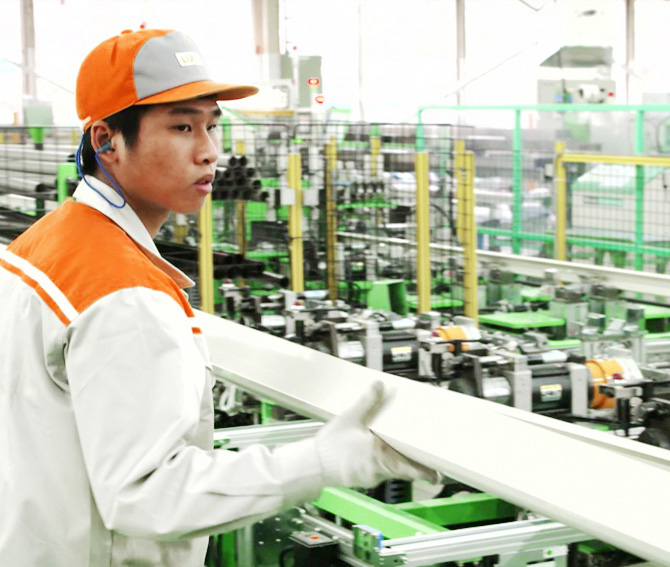
Improving production efficiency at LHT to shorten product development time and strengthen profitability
We have been very successful in terms of bringing down unit costs within LIXIL Housing Technology (LHT) by continuously improving the efficiency of our production lines as part of our platform strategy. This has helped us to bring down our fixed costs and allows us to renew our product lines at a lower level of investment. We will continue these efforts through this year while also looking to build our brand equity. The key is to give customers a product with better design and better technology.
However, we need to be aware of the broader industry trends. The number of new housing units in Japan, LHT’s largest market segment, is expected to decline over the next few years. In addition, new houses are expected to use products and materials with longer lifespans going forward. This means that our higher-quality and differentiated products can continue to sell well.
At the same time, we also expect long-term growth in the renovation market. Similar to what we see in our water technology business, consumers are already starting to look around their residences and trying to find ways to improve space usage now that more people will be working from home. As just one indicator, we are seeing more website traffic for renovation-related products than ever before.
Regarding the water business, you have talked about the importance of design and brand awareness. Is that another key part of your strategy?
Yes, absolutely. Design is a very important element, not only how a product looks but also how people experience it. Central to this is our in-house design organization under the global direction of Paul Flowers, LIXIL’s Chief Design Officer. Because he oversees products across all our product brands and geographies, we can provide an unmatched level of consistency. It may seem a small thing, but as a consumer, you want the color of your kitchen products all to match, so that an off-white in one LIXIL line will match the off-white tone of other products.
Our brand strategy also provides an important point of differentiation within our industry. Rather than segment products by price, we have given each brand its own identity. If you want a sleek urban type of bathroom, GROHE might be your choice. For a more traditional look with luxurious spaces, American Standard would be suitable. If you want Japanese technology with a more minimal look and feel, then INAX would be the natural choice. By focusing on lifestyle segments, we can avoid eroding brand equity when we want to try new product types and exploit new opportunities in new markets.
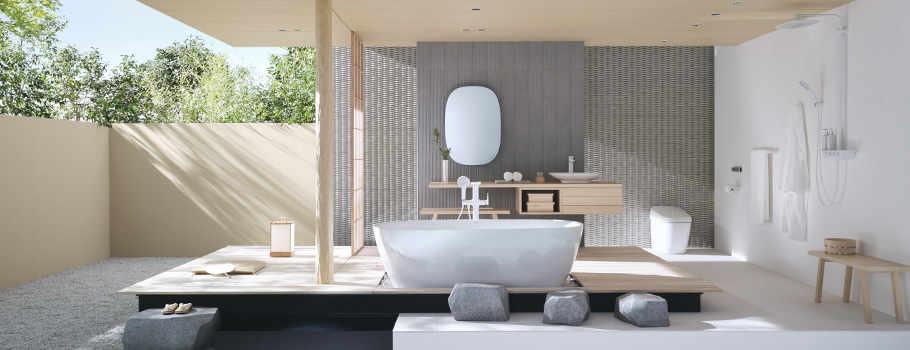
INAX’s sophisticated and thoughtful S600 product line embodying Japan’s rituals of water
You have also instituted a number of changes in your corporate structure. How does that help LIXIL going forward?
Our goal is to create a flatter organization that enables front-line employees to do their work more efficiently with less unnecessary oversight. In Japan, we delayered our sales structure and have reduced the number of branch offices, area branches and local outlets to drive efficiency. This delayering has also applied to the most senior levels of the company. Today there are 24 corporate officers, down from 114 when I joined.
In terms of our portfolio, we have also simplified our investments with the sale of our controlling interest in the LIXIL VIVA chain of home improvement stores and the sale of Permasteelisa, which has been a goal for some time. These are critical steps to enabling us to focus on our core businesses, drive investment in growth areas, and improve governance.
On top of this, we are merging LIXIL Group Corporation and LIXIL Corporation, a move that will enhance management efficiency by eliminating duplication of resources and improve Group governance. This action in many ways symbolizes our broader efforts to create a flat organization that is purpose-led and entrepreneurial. I see this as our most important job ahead.
You have talked about making LIXIL a purpose-led organization. Does this mean there is a diminished emphasis on bottom-line profitability?
Just the opposite. In today’s world, you must demonstrate that you stand for something. To achieve higher profits, you must create a meaningful company culture. We know that this is very important for our employees and consumers, and I believe that stockholders are now coming to understand this principle as well. If a corporation demonstrates its commitment to improving the world, consumers will take note and reward that company. We also believe this is a central part of making employees more engaged. If a LIXIL employee can see that their daily work is making a contribution, they will help the Company prosper to the benefit of all our stakeholders.
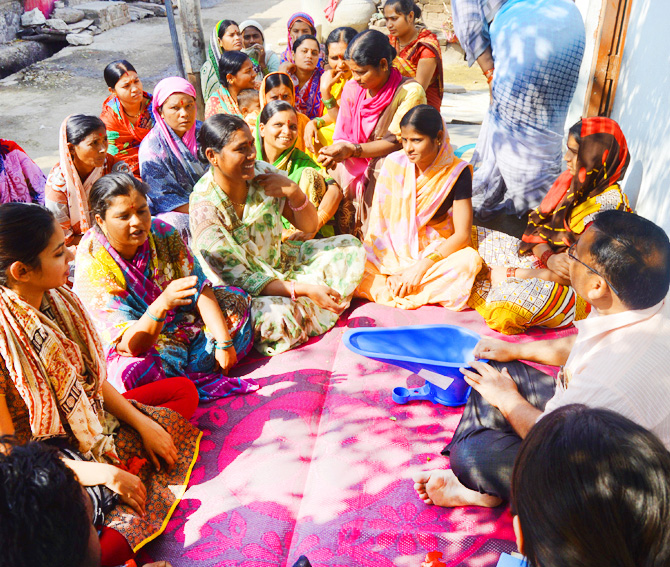
SATO toilet products are improving access to safe sanitation for 18.6 million people today
This can be clearly demonstrated by the success of our SATO social business. Through SATO, we provide basic solutions for the two billion people in the world who lack access to basic sanitation. This is no small mission, but it is an important part of our business. For example, in a recent promotion for shower toilets, we said that each sale would be matched with the donation of a SATO toilet in the developing world. Our employees believed this was a great opportunity to get involved and our business partners, seeing the benefit, told us that they wanted to promote more LIXIL products.
Based on what you have achieved this past year, what lies ahead for LIXIL?
We know that we will face difficult headwinds for much of the fiscal year. We must leverage the programs that we put in place to continue holding down costs and to embrace new ways of working and dealing with both consumers and professionals in the building industry. We will also keep an eye out for new market opportunities anywhere in the world, using our portfolio of brands to quickly fill market needs as we see them emerge.
And we must live up to our commitment of being a purpose-led organization. As part of this we have rolled out the SATO Tap, a new hand-washing solution. With the outbreak of COVID-19, we know that the simple task of hand washing is one of the most important ways to stop the spread of disease, but unfortunately, many people are not in a position to do so regularly. Our ability to develop, manufacture and bring this product to the market just when it is needed demonstrates for me what LIXIL can deliver – for consumers, employees and shareholders.
Watch interview highlights
Our Stories
- Backing People and Passions to Drive Innovation
- How Toilets in Schools are Catalyzing Change in Communities
- Building the Future by Recycling the Past
- Reinventing Consumer Connections in the World's Largest E-commerce Market
- Tackling Household Water Inefficiency in a Water-Stressed World
- Plugging the Plumber Shortage
- Pioneering Solutions to a Sewage Crisis in Rural Alabama
- Meet the Citizen Developers Changing How We Work
- Design and Brand Identity Transformation at LIXIL
- Three Changes to Prepare Europe’s Sanitary Industry for Growth
- Three Steps to Creating an Inclusive Culture
- From Linear to Circular: Giving Products in Your Home a New Lease of Life
- Crafting Unique Experiences as well as Products
- GROHE X: A Digital Brand Experience
- Design-led Innovation Delivering True Value
- Responsible Use of Plastics
- Empowering our People for an Agile Future
- Turning the Waves of Change into Opportunities
- SATO Tap: a New Handwashing Solution for All
- New Ways of Working Take Flight at LIXIL
- INAX: Rituals of Water
- Refreshing our sanitation targets, standing firm on our commitments
- Developing Attractive and Differentiated Products
- Conserving Water: The New Normal
- Insulating For a Warmer and Healthier Home
- Open Kitchen, Open Communication
- Tackling Open Defecation in India
- Shaping the Future of Faucets, One 3D Layer at a Time
- Bathed in Culture and Tradition
- Remodeling the Housing Market
- LIXIL's AQUA CERAMIC makes bathroom stains a thing of the past
- The Technology of Water
- Tackling Challenges in Global Sanitation and Hygiene
